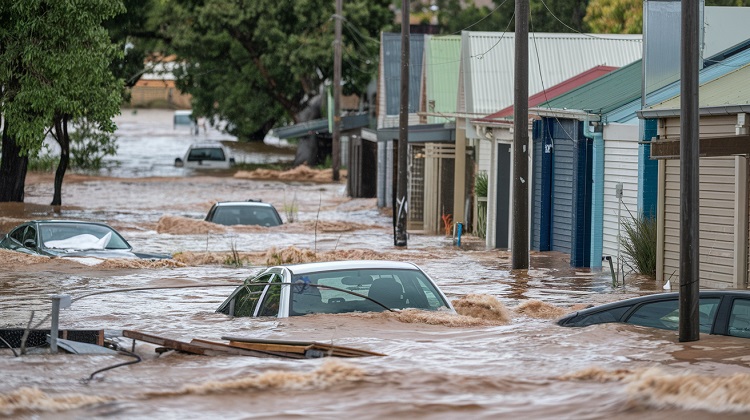Shocking new figures have revealed the state government has built fewer than 500 new social houses in the past year. Despite a record $5 billion investment to address the crippling housing crisis, 46,000 Queenslanders are still languishing on the waiting list.
In a significant move to address housing affordability and homelessness, the Queensland Government has rolled out a series of social housing initiatives. These programs aim to provide stable housing options for vulnerable individuals who are unable to access or sustain housing in the private market.
The government’s public and community housing initiative offers housing stability to eligible applicants. Eligibility hinges on several factors, including an independent weekly income of more than $226.81 for at least four weeks before applying. However, the combined gross assessable income for all tenants and their partners must not exceed $80,000 per year.
In addition to public and community housing, the state has introduced the Housing Investment Fund. This expanded $2 billion initiative aims to drive investment in social and affordable housing in Queensland. The fund is part of the broader Queensland Housing Strategy, which involves a $1.8 billion investment to deliver more social and affordable housing and transform housing services delivery.
The government’s commitment to alleviating housing pressures is clear in the 2023-24 Queensland Budget, with over $250 million dedicated to housing and homelessness support. The budget allocation will further strengthen the state’s social housing initiatives and improve housing outcomes for Queenslanders.
The Housing and Homelessness Action Plan 2021 – 2025 outlines key actions to ensure all Queenslanders have access to safe, secure, and affordable housing. This plan underpins the government’s strategy to tackle housing insecurity and homelessness head-on.
To apply for public housing and community housing in Queensland, individuals can visit a Housing Service Centre in person, contact them over the phone, or approach their local courthouse or Queensland Government Agent Program (QGAP) office.
Addressing Queensland’s Housing Crisis: Post-Covid Challenges And Solutions
The post-COVID crisis has had a profound impact on Queensland, leading to a severe housing crisis in the state. The rental housing market has been significantly affected, resulting in over 100,000 households in Queensland in need of low-cost housing. Vacancy rates have reached all-time lows, causing rents to skyrocket. Nationally, house rents have surged by 23%, with Brisbane experiencing a staggering 34% increase.
Consequently, homelessness rates in Queensland have surpassed those of other states. This housing crisis has highlighted long-standing challenges such as the lack of social housing and declining home ownership rates. While the Queensland government has taken some measures, including increasing funding for social housing, more action is required.
Expanding the Housing Investment Fund, implementing rental reforms, and promoting purpose-built rental housing are some proposed solutions. Additionally, regulatory reforms to protect renters and limit rent increases, as well as mandating affordable housing contributions by private developers, are necessary.
A comprehensive and coordinated approach by both the state and Commonwealth governments is crucial to address Queensland’s housing crisis.
Key Takeaways
- The post-COVID crisis has hit Queensland the hardest, leading to an increased need for low-cost housing in the state.
- The rental housing market in Australia, particularly in Queensland, is facing significant challenges with rock-bottom vacancy rates and soaring rents.
- The unmet need for social housing in Queensland exceeds 100,000 households, highlighting the long-standing challenges of low home ownership rates and an inadequate social housing system.
- Both the Queensland government and the Commonwealth government have taken steps to address the housing crisis, including increased funding for social housing and rental reforms, but more radical and sustained action from both levels of government is needed to effectively address the housing problems.
Causes and Impact
The post-COVID crisis in Queensland has resulted in a significant increase in housing need, with over 100,000 households requiring low-cost housing, exacerbating the existing challenges of a strained rental housing market, soaring rents, and a deficiency in social housing.
The rental housing market in Australia has been reeling due to the pandemic, with rock-bottom vacancy rates and record-high rent prices. Specifically, house rents in Queensland have surged by 23% nationally and 34% in Brisbane.
Additionally, homelessness in Queensland has experienced a higher increase compared to other states. The long-standing challenges of low home ownership rates and an inadequate social housing system have further contributed to the housing crisis.
While the Queensland government has made progress in rental reforms and funding for social housing, it is evident that more radical and sustained action is required from both levels of government to effectively address the housing problems.
Current Housing Situation
The current housing situation in Queensland reflects a dire state of affairs, with an overwhelming demand for low-cost housing and a rental market that is struggling to meet the needs of its residents.
The post-COVID crisis has hit Queensland the hardest, resulting in 100,000 households in need of affordable housing. The rental housing market in Australia is reeling due to the pandemic, with rock-bottom vacancy rates and soaring rents. In Queensland, house rents have surged by 23% nationally and 34% in Brisbane. This has led to an increase in homelessness, surpassing other states.
The unmet need for social housing in Queensland exceeds 100,000 households, highlighting the long-standing challenges of falling home ownership rates and an inadequate social housing system. While the Queensland government has made progress in rental reforms and funding for social housing, more radical and sustained action is required to address the housing crisis effectively.
Proposed Solutions
Proposed measures to alleviate the current housing situation in Queensland include expanding the Housing Investment Fund and extending rental reform.
The Queensland government has already pledged to double the Housing Investment Fund to $2 billion at the 2022 housing summit. This increased funding can help address the shortage of low-cost housing by supporting the construction of new units.
Additionally, extending rental reform can provide better protections for tenants and limit rent increases. Regulatory reforms are also necessary to protect private renters and reduce pressure on rents from Airbnb lets.
Mandating affordable housing contributions by private developers can ensure that new housing developments include affordable options. A comprehensive package of reforms, rather than one-off initiatives, is crucial to effectively address the housing crisis in Queensland and rebalance the housing system.
Collaboration with the Commonwealth’s National Housing and Homelessness Plan can further support these efforts.
Conclusion
In conclusion, the housing crisis in Queensland has been exacerbated by the post-COVID economic downturn. The lack of affordable housing options and rising rental costs have led to a significant increase in homelessness.
The Queensland government has taken steps to address the crisis, such as increasing funding for social housing and implementing rental reforms. However, more comprehensive measures are needed, including expanding the Housing Investment Fund and mandating affordable housing contributions from private developers.
A coordinated effort between the state and Commonwealth governments is necessary to effectively tackle this issue.
Albion News is a great place to find informative, up-to-date news articles. We provide a wide range of unique articles that offer an interesting perspective on current events from around the world and from various different sources. You can easily search for the topics that matter most to you and explore in-depth pieces that provide insight into the issues and important debates occurring today. Albion News helps you stay informed with carefully researched and credible stories!







